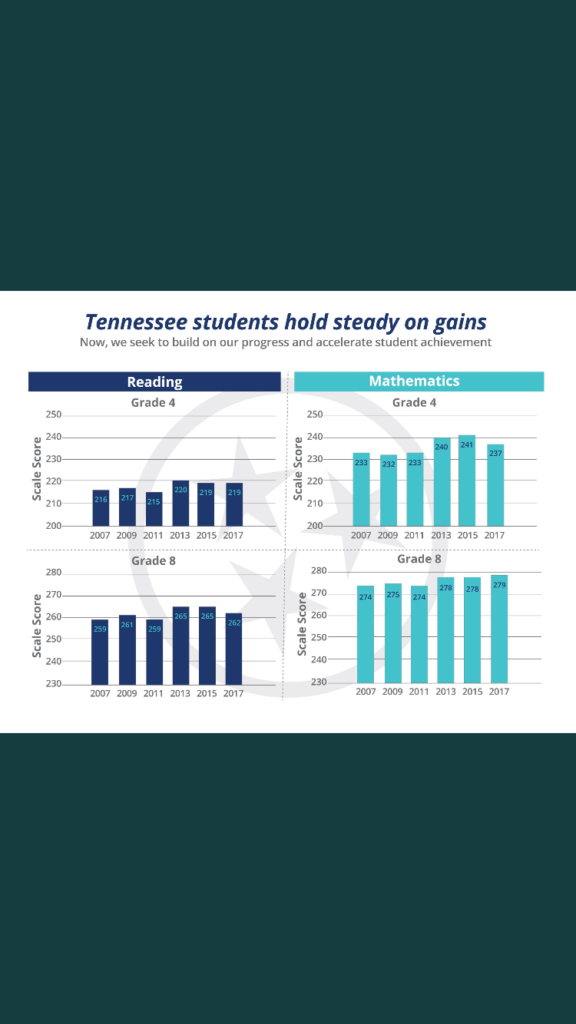Remember when UT was actually good at football? Not just good, the best. The Peyton Manning years. Tee Martin and the perfect season and national title. Remember that? What if I looked at you today and said, “UT Football is the best in the nation?”
You’d think I was crazy. Or that I was wishing for those glory days of the Big Orange that have, for now, passed us by.
What if I started talking about an event that happened SIX YEARS AGO that made Tennessee look really good in the education world? Would you say: Yes, but what about now?
Probably.
But not if you’re a Tennessee lawmaker pushing Governor Bill Lee’s school privatization agenda.
Specifically, House Education Committee Chair Mark White trotted out the “Tennessee is the fastest-improving state in the nation” on NAEP in math and reading line yesterday during debate on Lee’s ESA voucher scheme.
Then, Matthew Hill talked about how much Tennessee has invested in teacher pay over the years, as if our legislature has actually done something meaningful in the form of teacher pay raises.
White’s claim is nothing more than living in the “glory days” of Tennessee education policy. Hill’s claim is clearly, demonstrably false.
Here’s the deal: Back in 2013, Tennessee had a solid year on the NAEP — the National Assessment of Educational Progress. In fact, in key areas, Tennessee saw growth that outpaced the nation. It was, if nothing else, an encouraging sign.
Of course, there was reason to be cautious, even then:
Yes, Tennessee should celebrate its growth. But policymakers should use caution when seeing the results from the last 2 years as a validation of any particular policy. Long-term trends indicate that big gains are usually followed by steady maintenance. And, even with the improvement, Tennessee has a long way to go to be competitive with our peers. Additionally, education leaders should be concerned about the troubling widening of the rich/poor achievement gap – an outcome at odds with stated policy goals and the fundamental principle of equal opportunity.
White might have a point about Tennessee’s tremendous success on NAEP if we’d sustained that growth demonstrated in 2013. But, we didn’t. In fact, it seems the 2013 numbers were a bit of an outlier.

First, notice that between 2009 and 2011, Tennessee saw drops in 4th and 8th grade reading and 8th grade math. That helps explain the “big gains” seen in 2013. Next, note that in 4th and 8th grade reading and 4th grade math, our 2017 scores are lower than the 2013 scores. There’s that leveling off I suggested was likely. Finally, note that in 4th and 8th grade reading, the 2017 scores are very close to the 2009 scores. So much for “fastest-improving.”
Tennessee is four points below the national average in both 4th and 8th grade math. When it comes to reading, we are 3 points behind the national average in 4th grade and 5 points behind in 8th grade.
But maybe we’re closing the achievement gap? Nope.
Back in 2013, Tennessee students eligible for free/reduced lunch had an average NAEP reading score of 256 and scored 20 points below the non-eligible students. Now, that average score is 252 (four points worse) and 19 points below. For 4th grade, there’s a similar story, with free/reduced lunch eligible students scoring 25 points below their non-eligible peers this year. Four years ago, it was 26 points.
So, we had one really good year on the NAEP. Back in 2013. SIX YEARS AGO. And, well, that was awesome — unless you’re actually concerned about kids from low-income families. Oh, and it’s worth noting that this 2013 progress so often lauded by today’s lawmakers happened before a single student took a TNReady test. In fact, our scores have leveled off during the TNReady testing era.
But what about the claim from Hill about teacher pay? So many legislators suggested that Tennessee’s teachers are faring much better with the state’s “big commitment” to teacher pay in recent years. Even Jason “Judas” Zachary cited teacher pay raises in his video explaining his vote in favor of using public money to fund private schools.
Well, about that:
Average teacher salaries in the United States improved by about 4% from the Haslam Promise until this year. Average teacher salaries in Tennessee improved by just under 2% over the same time period. So, since Bill Haslam promised teachers we’d be the fastest improving in teacher pay, we’ve actually been improving at a rate that’s half the national average. No, we’re not the slowest improving state in teacher pay, but we’re also not even improving at the average rate.
So, that one time, Tennessee did that one thing that was kinda awesome. Since then, there’s been a lot of rhetoric and not much tangible improvement.
Oh, and even though we did have a really great year in 2013, we’re still 45th in the nation in school funding we now spend $67 LESS per pupil than we did in 2010 in inflation-adjusted dollars.
Glory days, indeed.

For more on education politics and policy in Tennessee, follow @TNEdReport
Your support — $1, $3, or $5 – helps make reporting education news possible.
